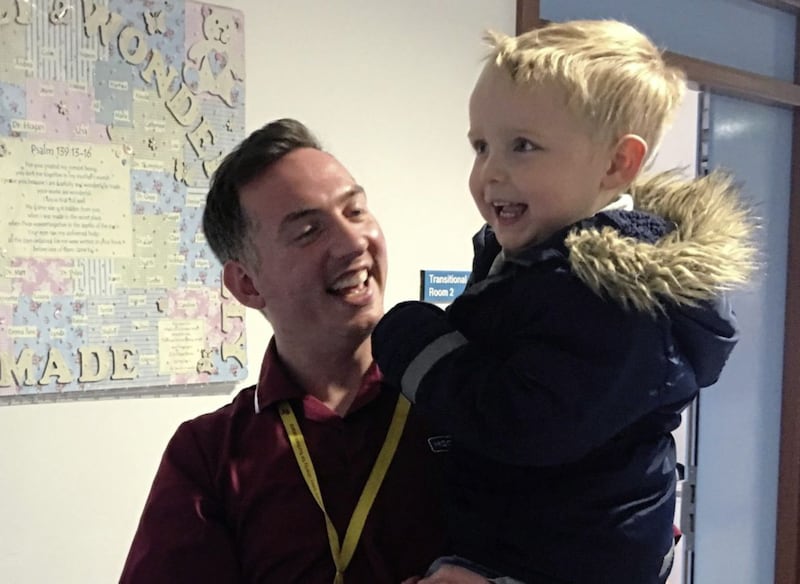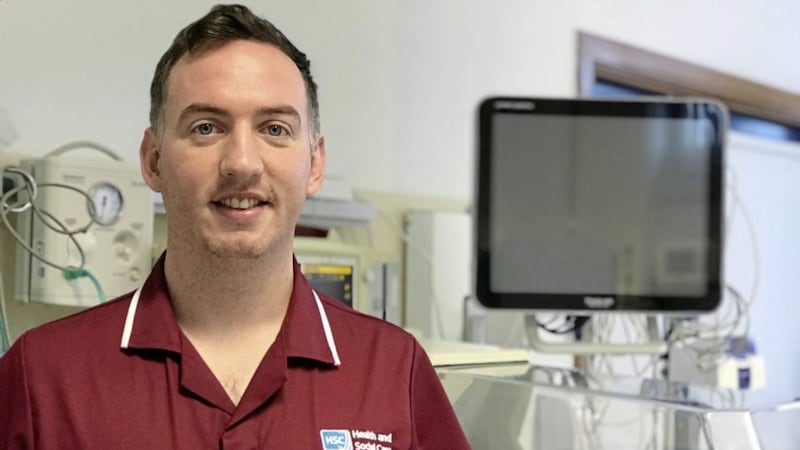COLM Darby nurses some of the tiniest and the most vulnerable patients in the Northern Ireland health-care system, a job you could almost say he was born to do. His dedication to his work recently earned him the honour of being named UK Neonatal Nurse of the Year for his 'outstanding service in the neonatal community'.
One of a team of dedicated nurses and doctors who care for newborn infants in the early days and weeks of their life, as well as babies who are born prematurely – some as early as 16 weeks before the normal 40-week gestation period – the 32-year-old is an advanced neonatal nurse practitioner for the Southern Health Trust, where he has worked for the past seven years.
But his interest in his field of specialisation started way before that; he and his family had first-hand experience of premature babies since both Colm himself and his identical twin Simon were born early; so too were their younger twin brothers Owen and Nathan.
“My mum had two sets of identical twins, which is quite rare, and me and my twin were born at 35 weeks, which is not usual for twins," he says. "While my twin and I didn’t require much intervention, my younger twin brothers were born at 28 weeks."
Colm is still quite overwhelmed at winning his award and says that the honour is even more welcome as he was nominated by a colleague.
“It was nice to be nominated by a midwife as we work very closely with them as we are caring for the infant while they are caring for the mother but to be nominated without knowing about it and by a colleague is quite an honour,” the north Belfast man says.
“I’m going to take this and take the motivation and roll out some more interventions in the future which will further help and improve the service of the Southern Trust.”
Already, Colm has developed a new protocol to promote breastfeeding and help reduce neonatal admissions, which is having a very positive impact on the outcomes for babies. The fruit of his labours has been introduced at Craigavon Hospital and will soon be introduced into Daisy Hill Hospital in Newry.
“When I was studying for my masters in advanced neonatal nursing, I decided to review how we managed admissions and identify ways of lowering them," he says. “With our consultant Dr Horgan, I identified the issue of babies having low blood sugars after birth – it’s a transient thing which can come and go, so the need was more about stabilising it after birth.
“I wanted to reduce our admissions for that reason, but I also have a great interest in empowering breastfeeding. That's something I know can be challenging when these babies are born early, but it’s the best source of nutrition for them.
“Our practice would have been that we always would have supplemented with an infant formula milk if the mother was breastfeeding and the baby was low on blood sugars.
“But there’s an intervention of using a glucose gel which can be absorbed in the baby’s gums which has proven to be as effective. By using that, we were also supporting the breastfeeding mothers by not introducing cow’s milk, which can increase allergies later in life, but we were also reducing the amount of admissions which were being managed in the postnatal ward.”
Colm was always drawn to nursing as a professional calling but his road into it was not as direct as he'd hoped.
“I wanted to be a nurse from a very young age and had been in the British Red Cross when I was younger. I didn’t get the grades at my A-Levels, but I still pursued a career in healthcare until I eventually got into nursing and made my way into the neonatal field.”
His family background lends him a pretty singular perspective on his job.
"I know my mum and dad went through a lot with Owen and Nathan's health-care issues," he recalls. "We only got to visit our brothers on Christmas day due to the restrictions that were in place back when they were born. I remember the weeks coming up to Christmas and the stress put on my parents and how we were being cared for by other members of the family as Mum and Dad spent a lot of time in the neonatal unit – and when they did come home they were exhausted.
“It was a very overwhelming experience for us as young people and I remember coming home that day in the car after Mum stayed behind, all three of us boys were crying as we just wanted your younger brothers would be OK.
“Today’s there’s a better family integrated care in neonatal where parents and grandparents can visit and there’s more of a role to empower the parents to regain their parental role – as sometimes the unit can be very medically led – including changing nappies, feeding and skin to skin holding.”
Colm has also become something of an ambassador for encouraging men into nursing and paediatrics.
“In paediatrics there’s a real role for male nurses as we offer a different paradigm of thought. Working with females is great but I don’t think like a female. I know it’s said that men can multi-task but believe me, I think I’ve proven that wrong on many occasions,” he says.
Colm's next area to look at for improvement is the care of infants who are born and have a shortened life expectancy.







